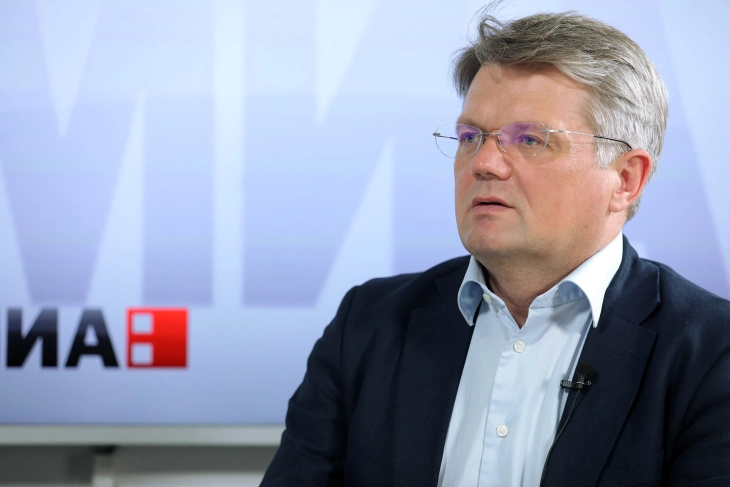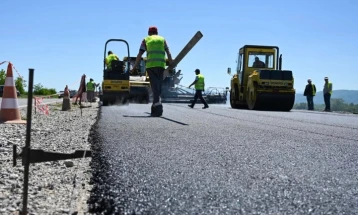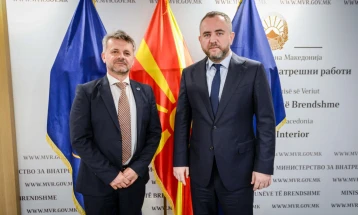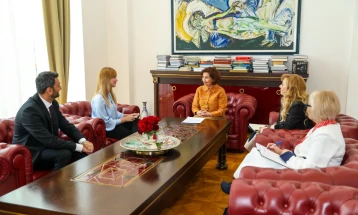North Macedonia in the middle to full EU energy integration, decarbonisation strategy needed, Lorkowski tells MIA
- North Macedonia is halfway to full EU energy integration. Our strong side is electricity, but what has to be improved is gas and decarbonisation, which still requires some efforts. The Government is expected to sent to the Secretariat a strategy up to 2030 explaining what the decarbonisation strategy is, what the renewable sources capacity is, what is the vision for integration in the regional market and what the future coal-based production capacities are. These are some of the messages of the Director of the Energy Community Secretariat Artur Lorkowski in an interview with MIA.

Skopje, 9 July 2024 (MIA) - North Macedonia is halfway to full EU energy integration. Our strong side is electricity, but what has to be improved is gas and decarbonisation, which still requires some efforts. The Government is expected to sent to the Secretariat a strategy up to 2030 explaining what the decarbonisation strategy is, what the renewable sources capacity is, what is the vision for integration in the regional market and what the future coal-based production capacities are. These are some of the messages of the Director of the Energy Community Secretariat Artur Lorkowski in an interview with MIA.
From January 1, 2026, every emission embedded in electricity, steel, cement, glass, aluminum, hydrogen, and exported to the EU will be subjected to pricing. But, there is one option for exemption only for electricity provided two conditions are met, according to him. The first condition is that the market coupling will be in place by 2025 so that the highest form of electricity integration of the markets would be in place by the end of 2025, and secondly that the government will commit to establish the carbon trading mechanism for the country by 2030. This requires legislation to be updated, said Lorkowski.

In the interview with MIA, Lorkowski underlined four main lessons learned from the energy crisis in the past two years - the cheapest electricity is the one not consumed, which is why we should go for energy efficiency and reduce the consumption of electricity by whatever means possible, we should invest in renewable sourches which have proven to be an efficient energy source and we should protect vulnerable consumers.
On how a major blackout in electricity supply in the region can be avoided, like the one on June 21, the head of the Energy Community Secretariat pointed out three steps that were discussed in an informal ministerial meeting of the Energy Community last week in Banja Luka - closer cooperation between the transmission system operators, better integration into the regional market and development of cross border infrastructure.
Asked what his vision is for the next ten years and how the country could position itself the best, Lorkowski said that his vision is that all of the contracting parties of the Energy Community will become EU members and the Energy Community will not be needed any more because "we are just preparing you for the full membership by offering and option for electricity for accelerated integration with EU in specific sectors."
"I hope that you will succeed soon with your EU negotiations that you will join EU, and then we can close the Secretariat of the Energy Committee the day after."
Asked where the country is on its European energy integration path, Lorkowski said North Macedonia is in the middle - we have have done half to join the European Union in energy and climate but there is still the other half to be performed and followed up on.
"I think this is a good message because you are progressing but still you have a lot to be done before you join EU. Where you're good and strong is electricity, a lot has already happened and been developed in the country, in North Macedonia. But what you have to improve is gas and decarbonisation, which still requires some efforts. That is basically why I'm here, to discuss with the new Government and Parliament and establish a work program for months and years to come on how to achieve this progress in the future," stated Lorkowski.

The Energy Community, he said, is offering a way for accelerated integration into the European electricity market, so even before joining EU and becoming a full-fledged member, North Macedonia and the other countries in the region can join the EU single market for electricity so that you can profit a lot more from biggest and most equipped market in the world.
"In doing that you have to simply align with the legislation and provide the same conditions for market operators as they are in the European Union. Afterwards you can join the EU market coupling, which is just a wording but to explain, it is a form of integration which is allowing your company to be treated exactly in the same way as any other company from the EU. For that you simply have to follow the legislation. The draft law has already been prepared by the previous government, but the work was suspended due to the elections. Now it the time to catch up and accelerate the work so that you can, as soon as possible, joint the EU electricity internal market," Lorkowski said.
To him, the establishment of a new energy ministry is a commitment to accelerated integration into the EU electricity market.
"It is a source of hope for me that the process of accelerated work would be possible if the Government would not only have dedicated a minister but also a group of people dealing with energy issues."
The Energy Community Secretariat's director said the Carbon Border Adjustment Mechanism is a policy created by EU incentivizing others to follow the EU climate agenda. It is not a policy dedicated only to North Macedonia or Western Balkan countries, but a policy which expects key trading EU partners like the United States, China, African and American countries to follow EU's climate policy, he noted.

The Carbon Border Adjustment Mechanism will be applicable from January 1, 2026. This means that every emission embedded in electricity, steel, cement, glass, aluminum, hydrogen, and exported to the EU will be subjected to pricing. But, there is one option for exemption only for electricity provided two conditions are met. The first condition is that the market coupling will be in place by 2025 so that the highest form of electricity integration of the markets would be in place by the end of 2025, and secondly that the government will commit to establish the carbon trading mechanism for the country by 2030. We are now in the process of accelerating our work to meet these two conditions and be exempt in the electricity sector," said Lorkowski.
We, he stressed, are discussing electricity exported to the EU and how to temporarily, after 2030, get an exemption from paying the carbon tax. Electricity export for example from North Macedonia to the EU neighboring countries like Greece could continue under the same conditions.
"That would not be possible, you exporting to EU countries, your export of electricity would be less competitive on the EU market. There would be consequences for the electricity producers in North Macedonia. Therefore, now we are not discussing the issue of how to tax the consumption of electricity in the country," he said in the interview.
Providing that the production of cement, electricity, glass, aluminum is based on the renewables you will not pay any tax, Lorkowski said adding the tax will be paid only on the border with the EU in case the production is based on coal and lignite, thus making the production dirty, meaning the technology and fuel used is not clean or environmentally friendly.
Interviewer: Aleksandar Atanasov
Translated by MIA's English Desk
Video: Andrej Brankovikj
Photo: Frosina Naskovikj







